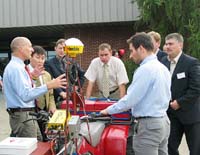Russian Delegation Visits Research Center in Princeton
Russian Delegation Visits Research Center in Princeton

A delegation of Russian businessmen interested in grain production and processing recently visited with agricultural specialists at the University of Kentucky Research and Education Center.
The group of eight and their interpreter spent the day at the research center as part of a nine-day visit to western Kentucky learning the ins and outs of the region’s grain industry. The group will also spend nine days in Washington, Ind. Each of the visitors are directors or deputy directors of companies that buy, store or process grains ranging in size from 35 employees to 360 employees.
“They are here to exchange ideas and pick up helpful information,” said Duane Miksch, retired UK veterinarian and Princeton program coordinator.
The Nov. 7, visit to UKREC highlighted U.S. grain production and trade, variety development, the UK integrated pest management grain storage program, Kentucky Farm Business Management Program, and agri-business management. They also were given an overview of the research farm and its facilities along with information on the land grant system and Cooperative Extension.
Alexander Zaitsev, general director of Portovy Elevator, said he and his colleagues were pleased with the information they are receiving and hope to take what they learn home to use in their own businesses.
“First and foremost I enjoyed the attitude of the people today because they saw us as equals, as colleagues,” he said. “During the presentations we had a very heated debate within the group because we were trying to compare the situation in American agriculture to what we have in Russia. Most of the challenges facing American farmers are the same as those in Russia will encounter. Of course, in America you have a very established system, as we’ve learned today, of land grant universities and Extension Service where in Russia it is very sporadic. We don’t have anything that would compare to the Extension Service.”
The group is in western Kentucky as part of the Center for Citizen Initiatives Productivity Enhancement Program. The Center, headquartered in San Francisco, Calif., has been offering training visits to the United States for Russian business people since the 1980s. Their local hosts are the Princeton Rotary Club.
Miksch is international chairman of the Princeton Rotary Club and said such programs are important in general cultural understanding and in working toward world peace.
In the past five years, Zaitsev said Russia has seen growth in private enterprise. Today, farmland and production facilities have an owner who is responsible for what they do and how they do it. In the 1990s when Russia went through the privatization process, a lot of people where interested in buying up enterprises just to resell them. Now they are more interested in production, he said.
“We are following the same trends as American agriculture but we are probably five to 10 years behind,” he said. “So it is very interesting for us to have a glimpse into the future and see what the future is going to be like in five to 10 years. We are trying to write down as much information as possible, filter the information and probably find something that will be useful in Russia that we’ll be able to implement when we go back to our country.”
Vadim Zakharov, deputy director of a grain processing facility, said he had several goals for his visit to the United States.
“My first goal was to get acquainted with the Americans and the way they live. We hear all about it, but it’s much easier to come here and see it,” he said. “My second goal is to get acquainted with the latest technologies, especially the sales technology.”
Zakharov said he was also interested to see if there are any items made from flour or grains available in America that aren’t available in Russia.
“We produce organic flour and hot cereal mixes and we sell it to the United States on a limited basis,” he said. “But I thought if I could come here and analyze the American market it would give me a perspective on how it would be better sold in the United States and what the American consumer is looking for. Also, probably the ultimate goal would be to find some investors that would be interested in investing in our company in Russia.”
In addition to their visit at the UKREC, the delegation planned to visit area grain farms, a local grain elevator, a milling company, an ethanol plant and several other grain-related businesses.
